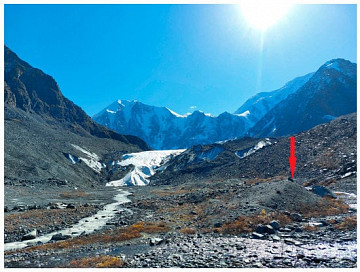Geographers of Altai State University discovered a serious degradation of glaciers in the Altai mountains
 Scientists from Altai State University, together with colleagues from St. Petersburg State University and the Institute of Geology and Mineralogy of the Siberian Branch of the Russian Academy of Sciences, have found out the rate and extent of the melting of Altai glaciers. Oleg Ostanin and Galina Dyakova from the Institute of Geography of the classical university worked as part of the scientific team.
Scientists from Altai State University, together with colleagues from St. Petersburg State University and the Institute of Geology and Mineralogy of the Siberian Branch of the Russian Academy of Sciences, have found out the rate and extent of the melting of Altai glaciers. Oleg Ostanin and Galina Dyakova from the Institute of Geography of the classical university worked as part of the scientific team.
The glaciers of the North-Chuysky ridge of Altai have halved in a century and a half. In the last decade, this process has accelerated dramatically - now every year the glacier retreats by about 14 meters. To establish this, the authors of the work analyzed a large amount of data: tags, satellite images, indications of temperatures and precipitation.
Scientists recalled that the melting of glaciers can greatly affect the mountain ecosystem. First, the reduction of the ice cover will lead to the expansion of the forest belt. Secondly, the water level in mountain rivers will change in different seasons of the year. Also, a sharp reduction in glaciers can provoke erosion of loose rocks in the mountains, which, in turn, can cause landslides and collapses.
The results of the study, carried out under a grant from the Russian Science Foundation, were published in the scientific journal Remote Sensing.
The study of the Altai glaciers was carried out within the framework of the project "Changes in climate, glaciers and landscapes of Altai in the past, present and future as the basis for a model of adaptation of the population of the inland mountainous regions of Eurasia to climate-induced environmental changes."